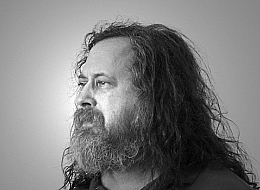-----
by Jolie O'Dell
 Free software pioneer Richard Stallman spoke with us recently about the principles of free and open source programs, and what he had to say is as relevant and revolutionary as when he first started working in this field 30 years ago.
Free software pioneer Richard Stallman spoke with us recently about the principles of free and open source programs, and what he had to say is as relevant and revolutionary as when he first started working in this field 30 years ago.
Our community has been talking a lot lately about what it means to be open, about what makes software open, about what makes companies open. No matter what talk of “openness” you hear in the media, no major web company — not Facebook, not Google, not Adobe and certainly not Apple — is creating truly free and open applications. Some may make gestures toward this ideology with APIs or “open source” projects, but ultimately, the company controls the software and the users’ data.
At the end of the day, if you want freedom and privacy, the only way to attain those goals is to abstain from proprietary software, including media players, social networks, operating systems, document storage, email services and any other program that is licensed, patented and locked down by a corporation. If you prefer convenience — well, best to stop complaining about your loss of freedom and/or privacy.
Like many heroes of the digital era, Richard Stallman is largely unsung by the general populace. Yet when it comes to user privacy and technological freedom, he’s probably one of the most committed individuals in the world.
By freedom, he means four things:
- The software should be freely accessible.
- The software should be free to modify.
- The software should be free to share with others.
- The software should be free to change and redistribute copies of the changed software.
Stallman started the Free Software Foundation. He even worked to make an operating system (GNU/Linux) that could be entirely free. And he is deeply opposed to proprietary software, software with commercial licenses that fly in the face of everything he calls freedom.
If you’ve ever downloaded music illegally, if you’ve ever complained about closed platforms, if you’ve ever gotten a serial number online for software you didn’t buy, if you’re worried about social networks controlling your data, you need to hear what Stallman has to say.
We got the chance to interview Stallman extensively at WordCamp San Francisco, and we’ll be posting segments of that interview each week. Stay tuned for insights on music sharing, Apple versus Adobe and more.
Note: Stallman asked that we use Ogg Theora, an open format, for encoding this video. To download the original video, go to its Wikimedia page. This video is published under a Creative Commons-No Derivatives license.
 Free software pioneer Richard Stallman spoke with us recently about the principles of free and open source programs, and what he had to say is as relevant and revolutionary as when he first started working in this field 30 years ago.
Free software pioneer Richard Stallman spoke with us recently about the principles of free and open source programs, and what he had to say is as relevant and revolutionary as when he first started working in this field 30 years ago.